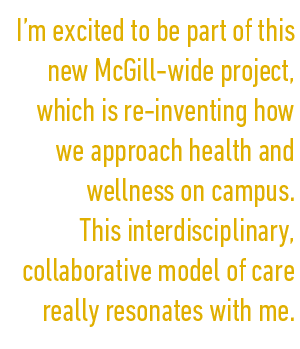McGill University kicked off its first-ever Well Week by announcing a partnership with The Rossy Foundation that will transform its approach to student wellness and mental health. As part of the Rossy Student Wellness Hub initiative, Wellness Advisor Shrabani Debroy has joined the Faculty of Law to promote mental health awareness and support early intervention within the student community.
 |
 |
Tell us a bit about your background
I completed both my Bachelor degree in Psychology and Master’s in Counselling Psychology at McGill University. I was previously working as a clinical crisis counsellor where I helped people with a variety of issues (anything ranging from “my kid won’t listen to me” to “I just escaped a mass shooting”). I was also in charge of training clinicians on online therapy modalities, so I have experience providing counselling in person, over the phone, and via chat.
During my undergrad, I worked as a research assistant in several research labs. I was obsessed with positive psychology and wanted to maximize my knowledge on what makes humans flourish. I also interned as a counsellor at Concordia University’s Counselling and Psychological Services, and I enjoy using strength and evidence-based frameworks, such as cognitive behavioral interventions. My work at Concordia and McGill confirmed that my favorite population to work with is the university student population, so I feel super grateful to be working in my dream job setting where I get to be a mental health clinician and an educator!
What is your role as Local Wellness Advisor at the Faculty of Law? What kind of support will you provide to law students?
The Local Wellness Advisor (LWA) roles were developed as part of the Rossy Student Wellness Hub initiative. Very briefly, we are in the process of creating a physical “one-stop” location, referred to as the Rossy Wellness Hub, where students can get help for their physical and psychological health needs. Counselling Services, Psychiatric Services, and Health Services will all be found under this hub, and this should facilitate the access of services.
In addition to this new centralized location, us LWAs (pronounced El-WA; a very funny sounding acronym) are located in strategic locations where students live and study. As such, my mandate at the Faculty of Law is “prevention, early intervention, and awareness”. More concretely, this means our roles are three-fold: we are here to offer programming tailored to students’ needs (i.e., holding workshops/info-sessions on relevant mental health related topics); we will provide one-on-one sessions to develop wellness plans with students (this starts in May) and can refer them to adapted resources and services. Lastly, we are also available for staff or faculty who may need to consult with us regarding sensitive issues with students.
In more general terms, we act as liaison between our respective faculties and the hub, and we are also wellness ambassadors and experts on all the different resources available. I’m excited to be part of this new McGill-wide project, which is re-inventing how we approach health and wellness on campus. This interdisciplinary, collaborative model of care really resonates with me.
What is your philosophy on wellness?
Wellness is definitely one of those psychological terms difficult to define operationally. To me, it is multidimensional, and it’s different for everyone, given that it is informed by our own unique beliefs, values, and definitions. Generally speaking, I think wellness can be described as having this subjective sense of well-being and life satisfaction. It is not an “absence of illness or stress” because we can still aim to remain “well” even when we’re confronted with adversities (I’m not sure anyone can completely avoid those).
McGill University uses the “Wellness Wheel” model consisting of the following parts: social, cultural, spiritual, academic, career, physical, financial, and emotional health. We all may give different levels of importance to each of those aspects of wellbeing, and that’s okay, but usually most of us do better when there’s a good level of balance between these interrelated parts. Wellness to me is about doing our best to improve all the significant areas of our lives so that we can constantly grow and feel fulfilled.
Ms Debroy can be reached by phone 514-398-3424 or by email. Her office is located on the 4th floor of New Chancellor Day Hall.
